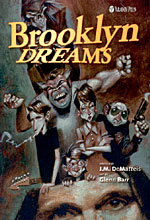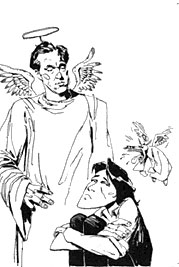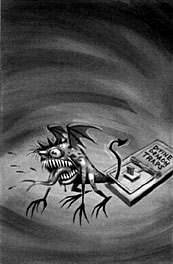
 Writer: JM DeMatteis
Writer: JM DeMatteis
Artist: Glenn Barr
Letterer: Bob Lappan
Collecting BROOKLYN DREAMS #1-4
Price: $12.95
Publisher: DC Comics/Paradox Press
"Everything that is thought and expressed in words, is one-sided, only half the truth; it all lacks totality, completeness, unity." - Herman Hesse.
Memory, unless you're an elephant, is ultimately fallible, not to mention completely biased. Our recollections of things change with time. The further back we go, the more nebulous our memories become, which can make cherished childhood memories a bit iffy.
JM DeMatteis tells us this much on the first page of BROOKLYN DREAMS:
"Perception is limited. Memory is faulty. I think the moment the words come out of our mouths, we create something wholly different from the truth we're trying to communicate."
Vincent Carl Santini (or is that Carl Vincent Santini?) sits in a darkened room, telling the reader the story of his senior year in high school, seen, of course, through the already mentioned veil of memory and time. A stand-in for DeMatteis himself - as BROOKLYN DREAMS is obviously, at least in part, autobiographical - Vincent recounts the story in exquisite detail, often getting derailed, spiralling the story down avenues that explore much more than his senior year, including, as per most DeMatteis stories, a spiritual awakening of some sort (and in my opinion, it's the only thing that tarnishes the story: the build-up is there, but it just doesn't pay off).
BROOKLYN DREAMS is a melting pot for the usual DeMatteisian thoughts on childhood, repressed memories, parents, drugs, sex, death and spirituality. Being DeMatteis, the search for God is something of an inevitability. It's a topic that pops up in most of his non-superhero comics (and sometimes then as well; take THE SPECTRE, for example).
 Unlike some of his recent work, this is one of the times when DeMatteis doesn't ram his beliefs down the reader's throat. Instead, it's a journey of self-discovery for Vincent and the reader, a walk through his mind, spewed onto the page via the shifting realities of Glenn Barr's black and white art.
Unlike some of his recent work, this is one of the times when DeMatteis doesn't ram his beliefs down the reader's throat. Instead, it's a journey of self-discovery for Vincent and the reader, a walk through his mind, spewed onto the page via the shifting realities of Glenn Barr's black and white art.
Vincent, narrating, is always drawn in an utterly realistic style, the wrinkles of time etched into his face, sometimes with paint, sometimes just straight pencil. This is markedly different from Vincent in his memory, where everything is exaggerated: Vincent is a bony, pointy chinned hippie-looking kid smoking dope; his father, a B-movie monster; his relatives horribly caricatured; his pain and demons given shape.
Barr's art perfectly captures the machinations of time and memory. The diverse styles Barr applies flawlessly compliment the writing, perfectly evoking different moods and time, the comical, the scary, the heartbreaking and the psychedelic. Barr's art communicates the essence of the book.
The themes in BROOKLYN DREAMS are familiar ground for readers of DeMatteis's work. We're also given another take on one of his favourite subjects: the sins of the father. Vincent's father, who originally comes across as both horribly unstable and heroically fatherly, is also seen, in the light of hindsight, as completely normal, a realisation that begins to dawn in the first chapter with one of the most profound events in Vincent's life: the death of his dog, Bilbo. Though the teenaged Vincent refuses to believe it, his father is human, devastated by the loss of the dog.
This echoes other fatherly relationships (or the lack thereof) in DeMatteis's other works, especially MOONSHADOW and SEEKERS INTO MYSTERY (albeit in a gentler, more realistic setting). I read MOONSHADOW years ago, and never really "got" it. Big giant smiley face gets girl pregnant. Girl gives birth to a son. Son travels the galaxy, and has a pet that, like Vincent Santini's, is named after a hobbit. Son gets rejected by his father. Maybe it's a Jesus allegory. I'll have to reread it one of these days.
 SEEKERS INTO MYSTERY, on the other hand, was an attempt to find the post-SANDMAN Next Big Thing, when every second new comic was billed as "an all new, ongoing series", only to fold a year later. Peter Milligan's MINX suffered in this way, but De Matteis's SEEKERS INTO MYSTERY got there first. It was given the flick early on in its proposed run, leaving, like any cancelled book, a lot of storylines unresolved, and forcing DeMatteis to wrap it all up early.
SEEKERS INTO MYSTERY, on the other hand, was an attempt to find the post-SANDMAN Next Big Thing, when every second new comic was billed as "an all new, ongoing series", only to fold a year later. Peter Milligan's MINX suffered in this way, but De Matteis's SEEKERS INTO MYSTERY got there first. It was given the flick early on in its proposed run, leaving, like any cancelled book, a lot of storylines unresolved, and forcing DeMatteis to wrap it all up early.
SEEKERS concerned an arsehole writer, Lucas Hart, who discovers the reasons for his being an arsehole, and goes on a search to rid himself of his demons. Along the way he meets strange little Indian gurus, aliens and angels, which were all the same thing. Or something. It could almost be seen as the companion piece to BROOKLYN DREAMS, especially in the way the main character talks directly to the audience, bringing us on his journey, but especially in terms of Lucas's relationship with his father, and how this shaped Lucas's life.
But as I stated earlier, BROOKLYN DREAMS is clearly semi-autobiographical, set in the 1970s. Any sightings of aliens or angels or giant glowing floating heads are due to Vincent's recollection of the events, his guilt and his drug taking. Instead of solely focusing on Vincent's father, Dominick, who was prone to paranoid delusions, we also meet his mother, Esther, a "classic Jewish wreck", and his older sister. The various crises also introduce the rest of family and friends, all brought to life by the art of Glenn Barr.
This is one story I think couldn't have been done as a straight prose novel (although it is a hefty book). It is one of the best combinations of art and words in comics. If everything expressed in words lacks totality, then in this case, the addition of pictures fixes that.
DeMatteis and Barr manage to involve the reader so completely, crafting believable characters and an engaging story, making BROOKLYN DREAMS stand out as a Book To Read. It may be autobiographical in nature, but it's also a universal story. We can relate to (most) of what Vincent has gone through. We've all had a pet die, had run-ins with the law, fallen in love and had our hearts torn out. It might not have happened exactly as we remembered it, but we have survived to talk about it.

This article is Ideological Freeware. The author grants permission for its reproduction and redistribution by private individuals on condition that the author and source of the article are clearly shown, no charge is made, and the whole article is reproduced intact, including this notice.


